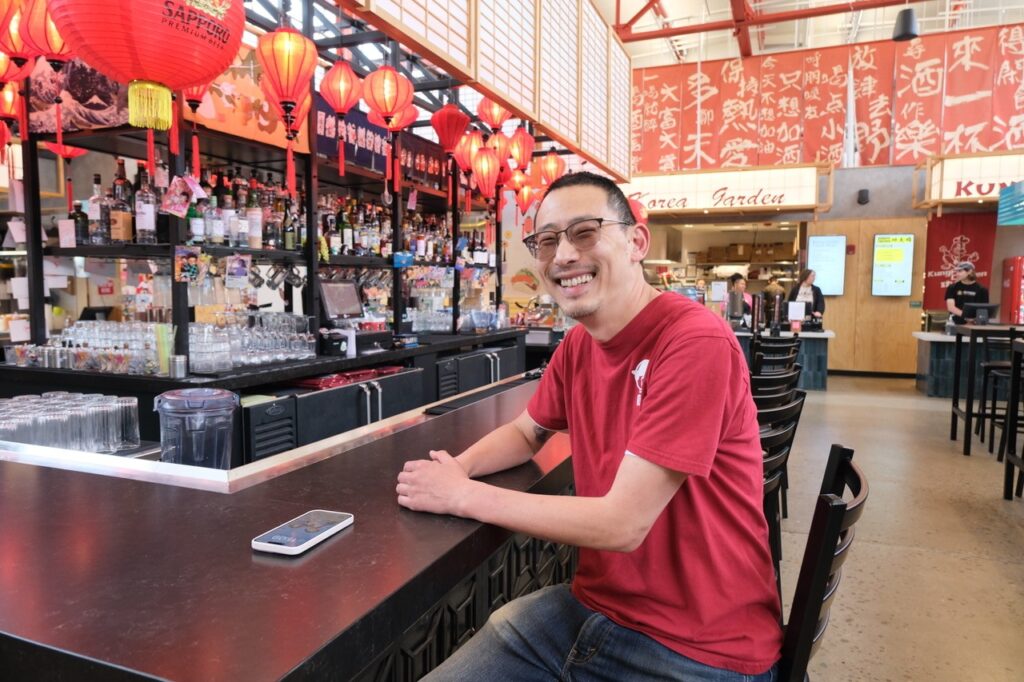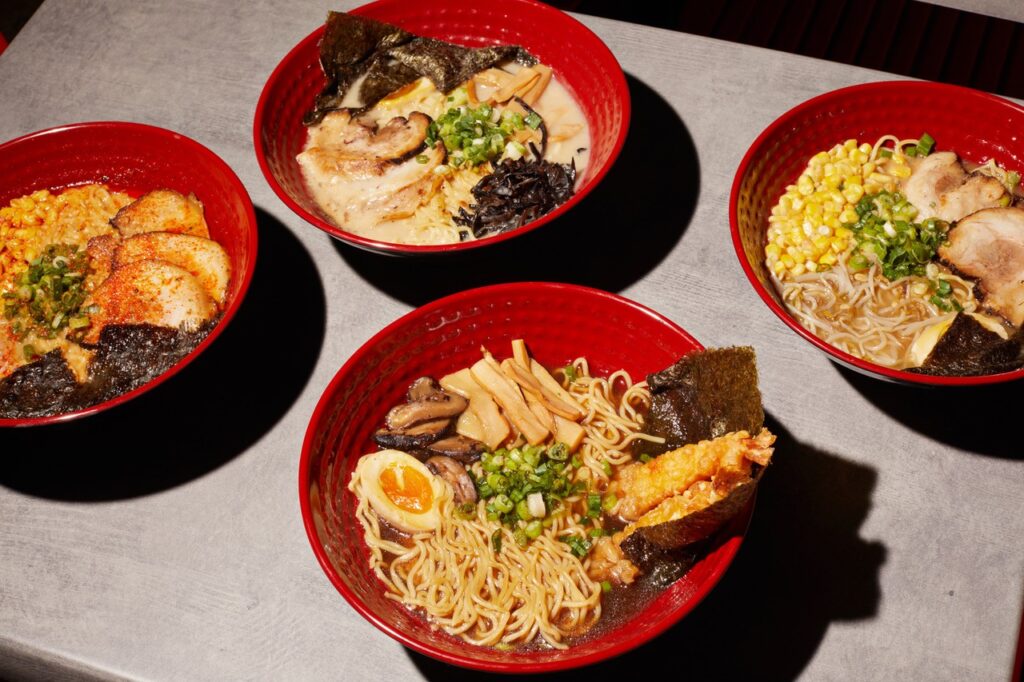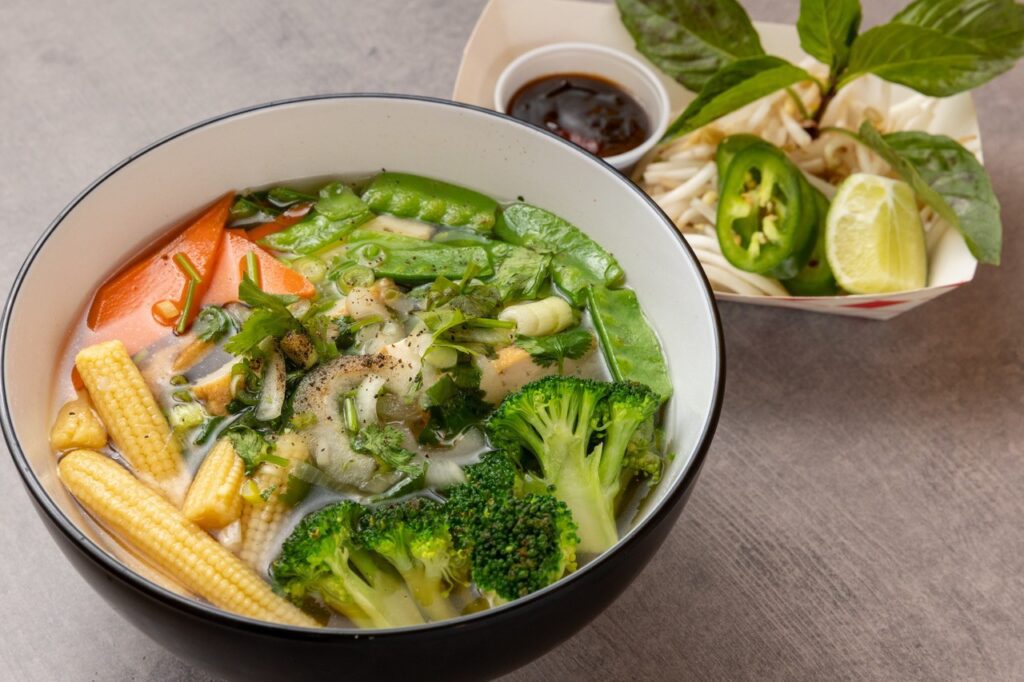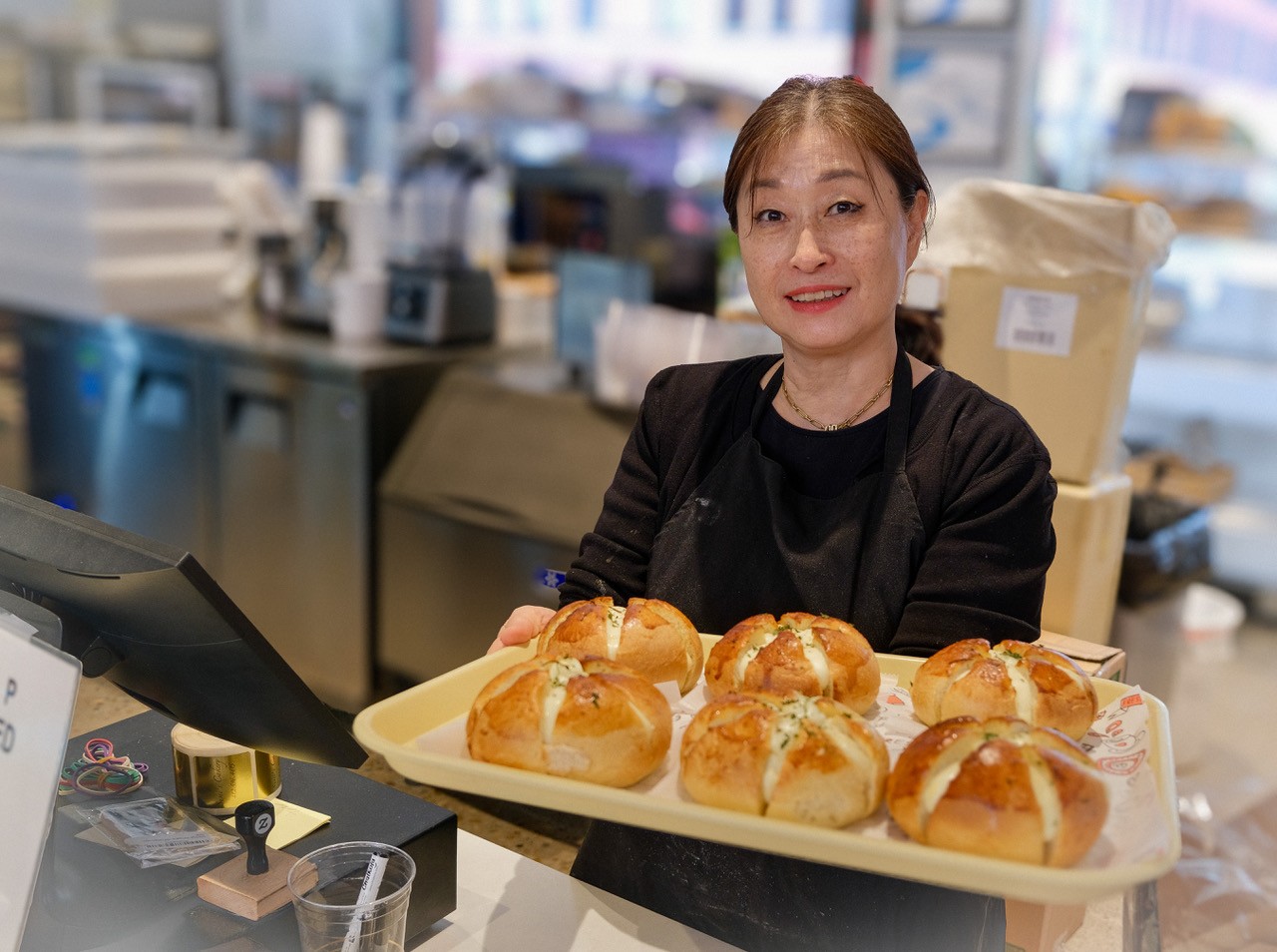BY Aakanksha Agarwal
While food halls were having a moment in Pittsburgh, Asian food halls were having a moment elsewhere.
“In bigger cities like New York they have two food halls just focused on Asian food,” says Alex Tang, of Mola fame. “Pittsburgh’s growing, it’s changing, it’s more diversified. That’s why I think this will be a good idea, to do something new.”
This is what led him to create Novo Asian Food Hall, dedicated to all things AAPI (Asian American and Pacific Islander). Picture more ramen, fresh sashimi, and boba tea than you can shake a chopstick at, all under one raised, skylit roof.
The colorful hall houses seven AAPI-owned businesses and a buzzing central bar, creating a foodie paradise similar to one you might find in Bangkok or Seoul – right here in the Strip District, Pittsburgh’s epicenter of cool.
A native of Taiwan, Tang began his culinary journey in New York City, where he honed his skills with various cuisines, from Italian to Chinese, in settings ranging from upscale eateries to bustling food halls. Tang immigrated to America with his wife Mimi, and their daughter Olivia (who manages the social media pages for Novo) was born here. After the hustle and bustle of New York, the family sought a calmer, more family-friendly environment, which they found in Pittsburgh.
“I was exposed to rich cultures and vibrant communities here in Pittsburgh,” says Tang. “I became motivated to collaborate with these people and create something special – a place where the many flavors of Asia could shine.”
“We wanted to bring this concept home”, says Matt Zelinsky, director of operations. “And Pittsburgh, rich with small Asian family-owned eateries, provided the perfect backdrop for our vision.”
The journey from concept to creation for Novo Asian Food Hall spanned from 2019 to 2024, amidst construction hurdles, licensing difficulties, and of course the unprecedented disruption of a global pandemic.
Today, Novo is a melting wok of flavors, cultures, and traditions that occupies an impressive 8600 square feet in the iconic Terminal building. Vibrant murals adorn the walls and oversized red lanterns sway gently overhead while bright neon signs beckon visitors.
Meander throughout the airy hall for a cornucopia of gastronomic delights – from Taiwanese golden fried chicken to Filipino Chicken adobo, slow-simmered Japanese ramen, and spicy Korean kimchi pancakes.

The central bar boasts a thick menu of extensive cocktails crafted from rare spirits, including the city’s largest variety of makgeolli, a Korean sparkling rice wine.
As the first Asian-only food hall in Pittsburgh, Novo fills a void in the market while celebrating the city’s multicultural landscape. It spotlights a curated selection of local AAPI small businesses, each offering their unique interpretation of Asian cuisine.
“The timing felt opportune,” says Tang. “By exclusively featuring Pan-Asian vendors, we champion authenticity and provide a platform for local Asian-owned enterprises to thrive, amplifying their voices within our community.”
Not to mention the chance to contribute to the economic growth and visibility of the Asian culinary scene in Pittsburgh, he adds.
While the long lines at peak hours attest to its success, Tang isn’t resting on his laurels. “The way I operate my business is I treat every day as if it’s the last day.” If he screws up, they won’t come back,” he says. “There’s never a day when everything is smooth. You’ve got to operate with a sense of urgency.”
Cleaning is priority, he says. His goal is for a very clean, grease-free space. It’s one reason why he designed the semi-open kitchens so customers could see past the counters to the busy food prep areas.
As you explore Novo Asian Food, you’ll encounter its seven distinct culinary concepts, some new to Pittsburgh, others with an established presence.
Mola: Alex Tang’s brainchild reimagines traditional dishes with a contemporary twist. A standout offering is the Tuna Poke Bowl—a departure from the ordinary poke, infused with Mola’s signature flair. With homemade poke sauce, bluefin tuna, and guacamole alongside standard poke ingredients, it creates a refreshing and distinctive bowl.
Teachana: Christina Chen is originally from China and has lived in Pittsburgh now for over a decade. After establishing her grocery store in the Strip District, Many More, she is excited to merge the worlds of boba tea and ramen at Novo, offering a unique dining experience.: “Boba tea and ramen are two of my favorite foods,” says Chen. “Whenever I travel, I seek out local boba tea shops and ramen places. So, I decided to bring these two different cuisines under one roof to introduce them to more people and share my love for them.”

Korea Garden: Seok Kun Han worked his way through kitchens in South Korea and New York before finally realizing the dream of opening a restaurant with his wife, Mun Ja, in Oakland. After 22 successful years in that space, they were happy to transition into a smaller space in Novo where they could sell classic Korean homestyle staples and street food. Korea Garden celebrates the essence of kimchi—a vital component of Korean heritage. According to Han, “Kimchi is more than just food to us; it’s a representation of our heritage and identity. For first-time tasters, approach kimchi with an open mind as its unique flavor can be quite different from Western fermented foods like sauerkraut. Start with small amounts to accompany meals, allowing your palate to adjust. Kimchi can be enjoyed as is, or used in various dishes like stews, fried rice, and pancakes to enhance flavor.”
Kung Fu Chicken: Kung Fu Chicken is the realization of first-time restaurant owner Qint Voit’s desire to bring the Taiwanese-style fried chicken and street food snacks that she grew up with to Pittsburgh, both for the Taiwanese community here and to expose Pittsburgh (a town that certainly does enjoy fried chicken) to different preparations and flavors. This establishment elevates fried chicken to new heights, emphasizing precise seasoning and cooking techniques. Voit underscores the importance of the spice blend in Taiwanese-style fried chicken. “A key component to Taiwanese style fried chicken is the spice blend both in the breading and the marinade. It is what makes it such a popular street food staple in Taiwan and is the sort of thing that we could not find locally so we were inspired to make it ourselves.”
Tan Lac Vien Vietnamese Bistro: Minh and Nguyet Luong are from South Vietnam and had been working in restaurants for over fifteen years before opening Tan Lac Vien in Squirrel Hill ten years ago. Novo represents their second location where they are excited to display Vienamese cooking and its depth of flavors to a larger audience. Tan Lac Vien takes pride in crafting the perfect bowl of pho, a labor-intensive process involving hours of simmering bones to create a rich, aromatic broth. Chef Minh Luong underscores the significance of time in pho-making. “Time is a key component of well-made pho, it takes a minimum of five to six hours to break down the meat while developing the rich flavor from our custom aromatics. And we don’t cut corners on our vegetarian broth either, that takes just a long to come together and you can taste the difference.”
Lolo’s Kusina: Maximilian Blume of Lolo’s Kusina is a first generation Filipino American. Before unveiling the first Filipino American kitchen in Pittsburgh, he and his partner Zoë Blume were fully dedicated to their other restaurant, Lola’s Eatery. Lolo’s Kusina pays homage to Filipino street food culture, offering bold flavors and vibrant dishes. Max Blume highlights the significance of their chicken adobo. “Out of the multitude of dishes indigenous to Filipino cuisine, the menu at Lolo’s is comprised of dishes that bring us, the owners, as well as other Filipino-Americans, back to our youth and roots. Our chicken Adobo, for instance, is a significant dish in Filipino culture, representing the blending of indigenous Filipino cooking techniques with Spanish influences.”
Sumi’s Cakery: Sumi Chun grew up baking with her family in South Korea. It wasn’t until after she moved to the United States later in life that she realized she could make a career out of baking and opened Sumi’s Cakery in Squirrel Hill. After a successful decade there, she has opened a second location in Novo. Sumi’s Cakery draws inspiration from Korean baking traditions, specializing in light and airy pastries with expressive flavors. “Korean baking traditionally is light and airy without being very sweet so that creates a lot of room to use fun flavors that will shine through,” says Chun. “Teas and fresh fruit in particular work wonderfully because they can be the expressive focus without being lost in sugar. For presentation, I tend to favor minimalist elegance over extravagant decoration since that complements the subtlety of the flavors.”
Navigating Novo is a breeze – you can approach a preferred vendor or use one of the convenient kiosks. Snag a prime spot on the patio for people-watching while indulging in a sake or a luscious taro boba tea, as life in the vibrant Strip District unfolds before your eyes. In addition to its culinary offerings, Novo boasts a Robo Shop, injecting yet another playful element with surprise-filled blind boxes.
The New Americans is a first-of-its-kind journalism initiative with the mission to spotlight the contributions of immigrants to the Pittsburgh region, and ultimately to create a more welcoming and global city. The stories are available for free to all Pittsburgh media. Read more stories here.


